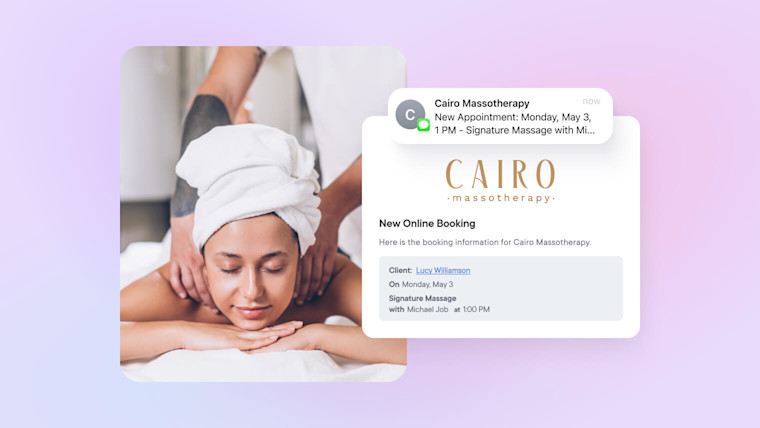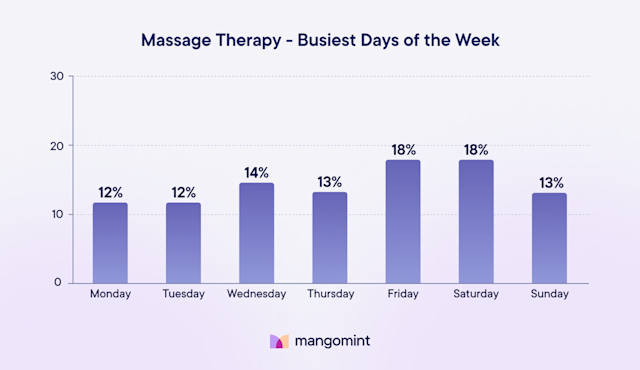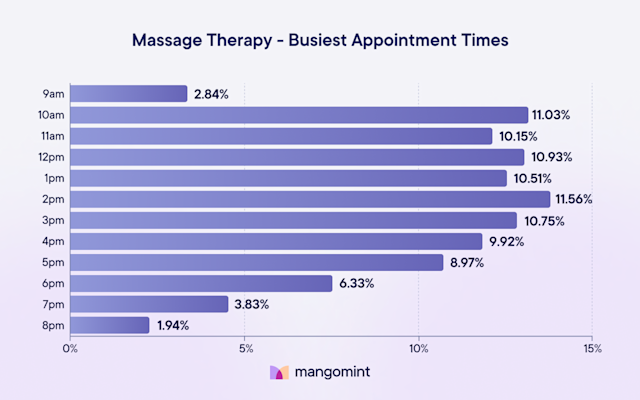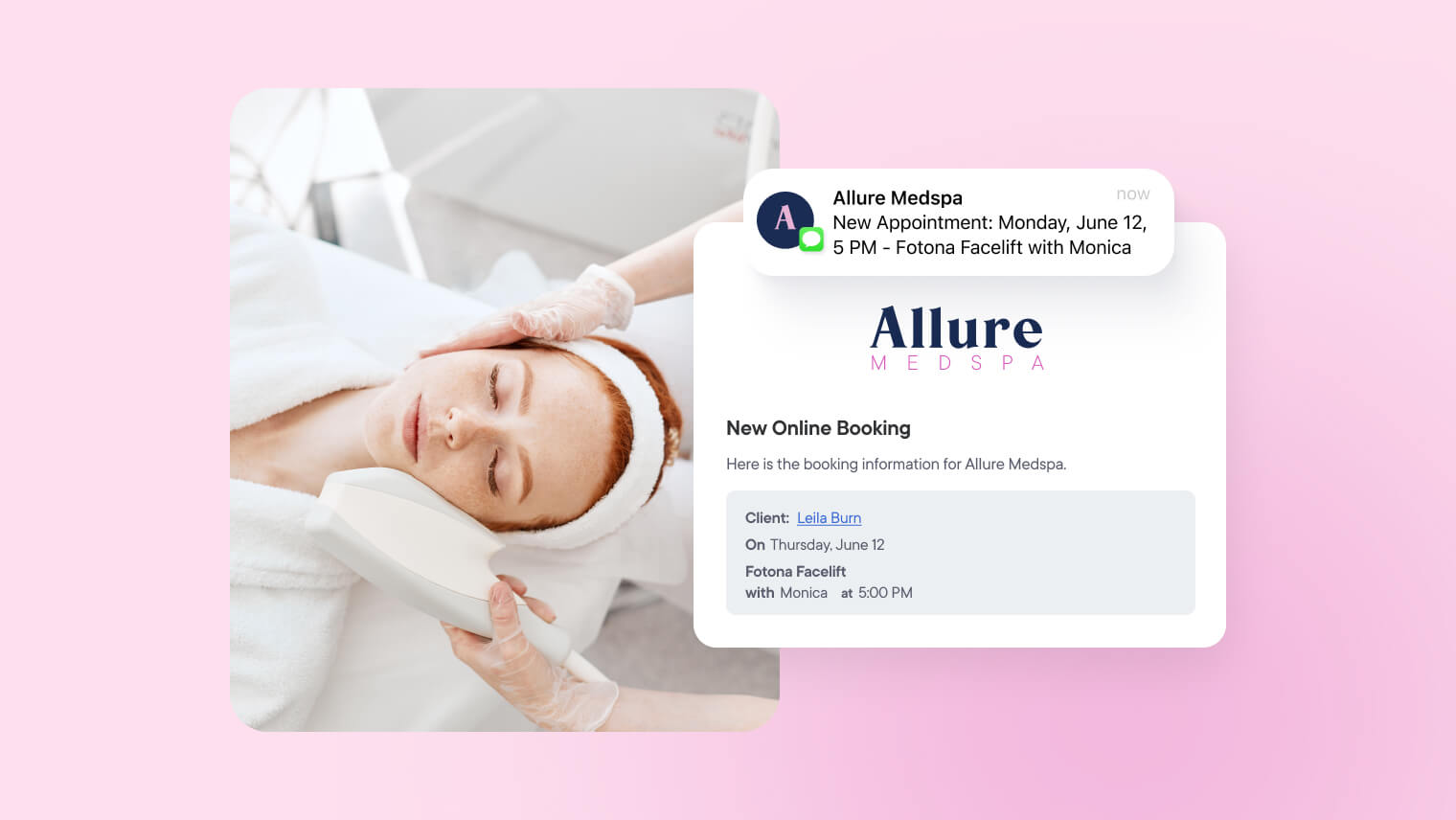
Massage therapy booking statistics and insights
Find the data-driven insights you need to optimize your massage therapy business to client booking and appointment preferences.

Content Marketing Manager
By tuning into your clients’ appointment preferences, you can adjust your business practices to deliver a more personalized and profitable experience.
Using recent sample data from 109,561 massages booked in Mangomint’s massage therapy software, let’s dive into data on client booking preferences.
How massage therapy clients prefer to book their appointment
Manual booking (such as phone or in-person scheduling) is the preferred method of booking massage therapy appointments. This is likely because many massage clients rebook at the end of their sessions or have routinely recurring appointments. In total, 43.38% of massage therapy appointments are booked online compared to 56.62% of appointments scheduled via phone bookings, in-person scheduling, and automatically recurring appointments.
43.38% of massage therapy appointments are booked online
However, this online booking rate is still higher than other appointment types often found within spas, including facials & skincare (21.78% online booking) and injectables & fillers (21.89% online booking).
In industries with predominant phone scheduling, it is helpful to leverage booking features tailored to streamlining this process, like Express Booking™. This tool texts clients a link to enter their contact and payment information during phone booking, alleviating the extra pressure and time requirements on your front desk staff.
Which days are the busiest for massage therapists?
The end of the week is the busiest time for massage therapy schedules, with nearly 50% of all massage appointments happening between Friday and Sunday. While Friday is a popular appointment day across beauty and wellness businesses, massage therapy businesses are unique in their weekend popularity. For example, other spa appointment types (like injectables and fillers) are more common earlier in the week, with Tuesday and Wednesday being the busiest days.
This pattern seems to reflect the massage therapy industry’s longer appointment durations and the goal of achieving restoration and relaxation, which might be hard for clients amid other mid-week obligations.

The busiest days for massage therapists are as follows:
Friday (18% of appointments)
Saturday (18% of appointments)
Tuesday (12% of appointments)
Monday (12% of appointments)
Wednesday (14% of appointments)
Thursday (13% of appointments)
Sunday (13% of appointments)
The busiest time of day for massage therapists
When creating your staff schedule, it is essential to plan around the expected appointment traffic. 2pm is the busiest time of day for massage therapy appointments, accounting for 11.56% of massage appointment start times.
While beauty sectors (like hair and nail salons) are busiest in the morning, this mid-day appointment preference reflects a common pattern among wellness businesses, likely as clients plan around work schedules, lunch breaks, childcare obligations, and other responsibilities.

The busiest times for massage therapists are as follows:
2pm (11.56% of appointments)
10am (11.03% of appointments)
12pm (10.93% of appointments)
3pm (10.75% of appointments)
1pm (10.51% of appointments)
11am (10.15% of appointments)
4pm (9.92% of appointments)
5pm (8.97% of appointments)
6pm (6.33% of appointments)
7pm (3.83% of appointments)
9am (2.84% of appointments)
8pm (1.94% of appointments)
All other service times account for less than 2% of massage therapy appointments.
How common are massage therapy appointment cancellations?
On average, 16.93% of massage therapy appointment bookings end in cancellation. The massage therapy cancellation rate is lower than other spa service appointment types, including facials & skincare (21.78%) and injectables & fillers (21.89%). This difference could be because massage therapy appointments are often tied to routine appointments and extended service plans.
16.93% of massage therapy appointment bookings end in cancellation
Cancellation rates can have an impact on your massage therapy business’s schedule, availability, and bottom line. This number can be influenced by a few factors, including your cancellation policy, whether you require a deposit or holding fee for booking, and whether or not you send automated appointment reminders. Making these adjustments in a massage therapy booking and management software can help lower your cancellation rate and protect your business from financial losses. For example, Mangomint can require deposits during online booking, save the client’s card on file, ensure clients acknowledge & accept your cancellation policy before moving forward, and automatically remind clients of their upcoming appointment times within your rescheduling window.
Try Mangomint for free
See Mangomint in action instantly with pre-populated sample data. No credit card required. Free for 21 days.
Try it nowMangomint massage therapy management software
Mangomint provides an improved online booking experience, which can help maximize your massage therapy operations and boost revenue.
With our suite of massage therapy management features, like advanced charting (including body charting, facial charting, and SOAP note support), client management, staff management, and time-saving automations, it is easy to understand why we are the highest-rated massage therapy software. You can explore Mangomint for free with a trial account or a live demo to get started today!


